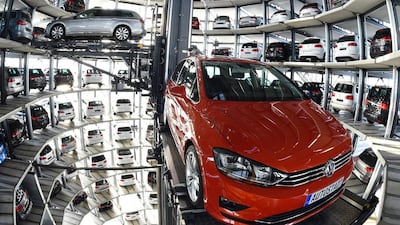Here is something you will not hear many British, Europeans or Americans say: "the world needs German leadership". Germans do not say it openly either. I happen to believe it is true, and not just because I am sitting drinking coffee in Blankenese, a small town by the River Elbe on the outskirts of Hamburg as I write this. Germany in the 21st century has fully atoned for the sins of the 20th century. Here the Second World War and the Holocaust are not history. They are not even past. Round the corner from the apartment where I lived in Berlin, small copper plaques remember every Jewish family taken to the death camps. At the end of one of Berlin's upmarket shopping streets stands Wittenbergplatz station. Outside there is a massive sign naming the places where political prisoners, communists, Jews, gypsies and others were taken to their deaths more than 70 years ago. No country on Earth has done so much to understand the consequences of its past as modern Germany.
Germans will not forget, nor should anyone else. But we need to move on. The shameful recent demonstrations by neo-Nazi thugs in the US simply would not be tolerated in tolerant modern Germany. Hamburg, according to a recent survey, is one of the world's top ten most liveable cities. It is socially, culturally, historically and materially rich. The German Wirtschaftswunder - economic miracle - is visible every few minutes here on the Elbe estuary. Massive container ships come and go, some so big they resemble skyscrapers turned on their sides, blocking off the sun. Airbus has an enormous factory on the opposite bank of the river from where I am sitting. The world's biggest car manufacturer, VW, is in Wolfsburg, not far away. And despite various scandals hitting Germany's car industry in recent years, including cheating over diesel emissions, car-making is a huge source of pride. As Der Spiegel magazine noted, "Made in Germany" is an "absolute mark of quality". Mercedes, Porsche and BMW owners worldwide will undoubtedly agree.
MORE FROM GAVIN ESLER
BBC pay row should make us all question what we're worth
Twitter trolls and our depressing age of unenlightenment
My father and great uncle and their world war experiences
But economic leadership does not easily translate into political leadership. In fact the word "leadership" does not translate easily into German at all. The word is "Führerschaft," and Führer is Germany's ultimate "F" word. It does not take a linguistic genius to note that it has unpleasant echoes of the worst moments in German history. A few years ago when I was making a TV documentary that included an interview with chancellor Angela Merkel, a number of thoughtful German leaders and commentators I talked to in Berlin about "leadership" admitted that the word and the idea of leadership continually presented Germany with difficulties. Mrs Merkel, who, opinion polls say, will probably be re-elected chancellor next month, has tried to counter the Bossy German image, but with limited success. Greek newspapers, commentators and cartoonists in recent years have reflected the pain of their country during the euro crisis by suggesting Mrs Merkel's Germany in the 21st century was echoing Nazi Germany by imposing hardship on others. It was an easy hit, even if comparisons with the Nazis are ridiculous as well as offensive. But the resentment has real roots. The euro crisis is not over, and the supposed "solution" has benefited Germany while beggaring Greece.
MORE ON GERMANY
Architects and refugees team up to make affordable homes
How Volkswagen's iconic Beetle conquered the world
In Germany, environmental awareness doesn't mean hardship
Donald Trump's trade adviser, Peter Navarro, put it very bluntly when he said earlier this year that as far as the German economy is concerned the euro is "grossly undervalued". He is right. The euro exchange rate makes those German cars leaving Hamburg very competitive, while ensuring that the currency remains over-valued in southern Europe, contributing to massive unemployment in Greece and elsewhere. This is a problem without an obvious solution. Even a single "European government", in the unlikely event it ever happens, could not easily integrate the economies of a country producing Mercedes with those producing grapes and tomatoes. But Germany did not create the euro problem. Indeed, Germans often regret that the common currency was forced upon them by France as the price of German unity.
And that's why I want German leadership. Mr Trump's America is not leading anyone anywhere. Britain, pre-occupied with Brexit, cannot lead in Europe since the EU is a club it no longer wishes to be part of. The Macron government has yet to prove it can lead even in France. Italy? Er, no. If Angela Merkel is re-elected next month, I doubt even she can solve the fundamental contradictions at the heart of the euro. But she could help Britain minimise the damage a botched Brexit could do across Europe. And she could minimise the damage American protectionism could create worldwide. And she could make the case for tolerance and use Germany's wealth and moral leadership to help re-settle refugees in their homelands when it become possible. Now is the time for "Made in Germany" politics too.
Gavin Esler is a journalist, television presenter and author


